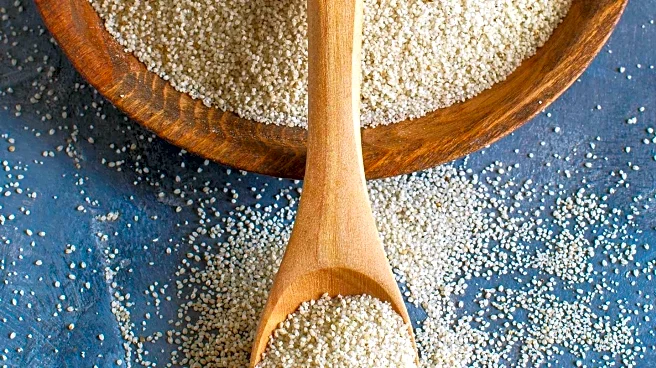What's Happening?
Psyllium husk, derived from the Plantago ovata plant, is gaining attention for its health benefits beyond aiding digestion. Known for its laxative properties, psyllium husk forms a gel when mixed with water, promoting regular bowel movements and increasing daily fiber intake. Nutritionists are highlighting its ability to lower LDL cholesterol by binding bile acids in the gut, improve blood sugar control by slowing carbohydrate absorption, and enhance satiety through delayed gastric emptying. Additionally, psyllium husk acts as a prebiotic fiber, nourishing beneficial gut bacteria and supporting a healthy gut microbiome, which is crucial for immune function, digestion, and mental wellbeing.
Why It's Important?
The rising popularity of psyllium husk reflects a shift in nutritional focus from calorie reduction to enhancing diet quality. As more individuals experience gastrointestinal disturbances due to sedentary lifestyles and poor diets, psyllium offers a concentrated source of fiber with proven health effects. Its ability to lower cholesterol and improve blood sugar control can contribute to heart health and reduce the risk of insulin resistance. By promoting satiety, psyllium helps with appetite control, potentially aiding in weight management. The support for gut health underscores the importance of a balanced microbiome for overall health, including mental wellbeing.
What's Next?
As psyllium husk continues to gain traction, consumers are advised to incorporate it gradually into their diets, ensuring it is mixed with sufficient water to prevent thickening before reaching the gut. Individuals with specific health conditions should consult healthcare professionals before use. The growing interest in fiber-rich diets may lead to increased research on psyllium's long-term health benefits and its role in preventing chronic diseases. Nutritionists may continue to advocate for its inclusion in daily diets, potentially influencing dietary guidelines and public health recommendations.
Beyond the Headlines
The popularity of psyllium husk highlights broader trends in health and wellness, where consumers are increasingly seeking natural solutions for common health issues. This shift may influence food industry practices, encouraging the development of fiber-rich products and supplements. The focus on gut health also aligns with emerging research on the gut-brain axis, suggesting potential implications for mental health treatments. As awareness grows, psyllium husk could become a staple in health-conscious diets, reflecting changing attitudes towards nutrition and preventive health care.









